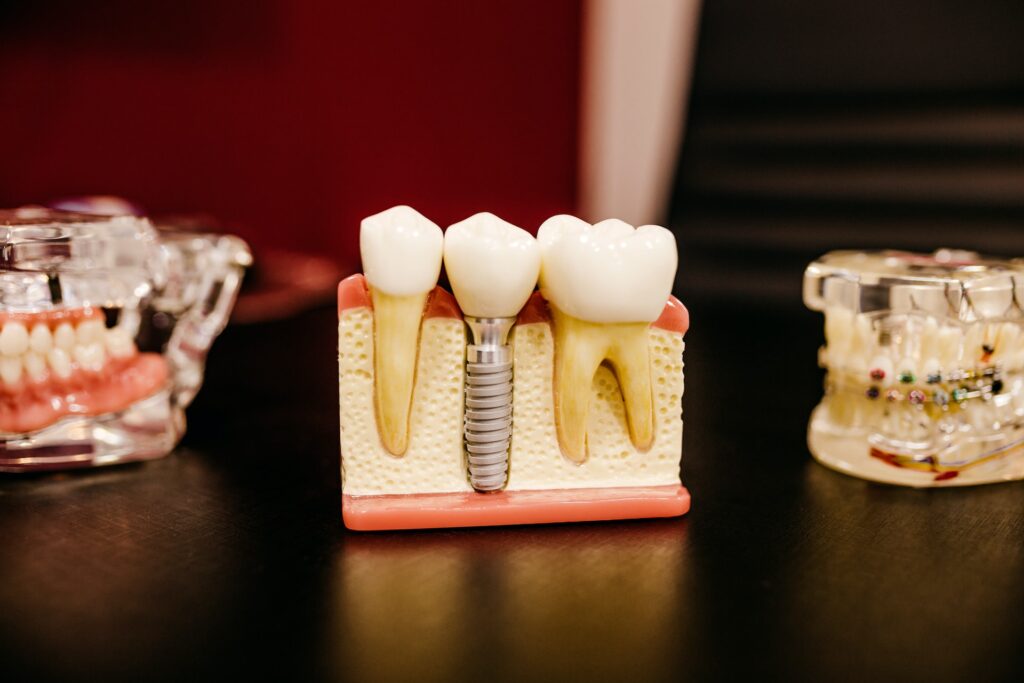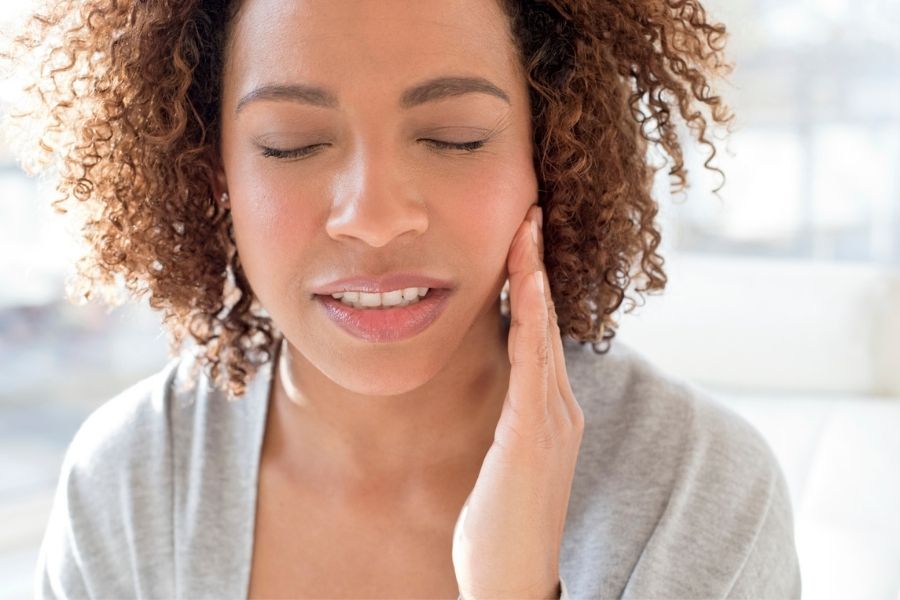Every tooth’s root has a small opening known as a canal that is filled with nerve fibers and blood vessels that provide nutrition to our teeth. These blood vessels and nerves are crucial to the health of your teeth; if they become infected, they may start to hurt significantly.
If your teeth get infected, you may need a root canal to disinfect the painful, infected area, prevent reinfection, and preserve your tooth to avoid having to replace it. When performing the procedure, your dentist will extract the inflamed or infected pulp — the material in the root of your tooth that contains the nerves, connective tissue, and blood vessels. They will then carefully clean the area, fill it, and seal the inside of the tooth to prevent reinfection.
The School of Dental Medicine estimates that more than 15 million root canal procedures are carried out annually. Every day, more than 41,000 root canals are performed — they are very common. The good news is that the treatment’s efficacy has a solid track record. Given how frequent dental root canal procedures are, you have probably heard of them. To better assist you in understanding root canals, this article offers information on when this procedure is necessary.
What Leads to the Need for a Root Canal?
A root canal procedure is needed when a tooth exhibits symptoms of infection or significant pulpal nerve damage. Bacteria can get into the pulp when a tooth is broken or has a large cavity. If this situation is not addressed, it may result in a serious infection, bone loss, or even the loss of the tooth.
To give you a clearer picture, here are the most frequent factors that lead to pulpal nerve damage and require root canal treatment:
- Tooth decay
- Fractured tooth
- Leaky fillings
- Trauma to the tooth that leads to nerve damage
Pulpal Damage Symptoms That May Require a Root Canal
Here are the following signs and symptoms of a pulp infection that may need a root canal:
- Pain when chewing or biting
- A loose tooth
- Teeth that are too sensitive to cold or hot beverages
- Facial, jaw, or cheek swelling
- Gum tenderness and swelling
- Tooth discoloration or tooth graying or darker color
- There’s a flow of pus or fluid from the tooth
When To See Your Dentist
It is extremely important to go to the dentist if you have tooth pain. The pulp in your tooth cannot recover on its own if it is infected. A tooth infection that is left untreated could get worse. This kind of infection, if untreated, can result in tooth abscess, pulp death, bone loss, tooth loss, and extreme pain.
Your dentist in Maryland will recommend a root canal if you experience ongoing tooth pain or swelling in the mouth or gums, especially if the pain or swelling is brought on by an infection deep inside the tooth.
Aside from checkups, ultrasounds, and lab tests, pregnant women should also make sure not to miss their regular dental appointments. After all, being pregnant increases your risk of oral health problems. Remember, it’s part of your overall wellness, so you should take extra care of your mouth, gums, and teeth during this time.
Don’t worry; routine dental visits are safe for most moms-to-be. The same goes for procedures like x-rays, tooth extractions, and fillings.
This article will discuss everything you need to know about keeping your teeth healthy and how it plays a crucial part in prenatal care.
Common Oral Health Problems During Pregnancy
Pregnant women typically have high progesterone levels, which encourage bacterial growth around the teeth and gums. For this reason, they become more prone to the conditions mentioned below.
-
Gingivitis: Approximately 60 to 75% of pregnant women have gingivitis, and untreated incidents may lead to periodontal disease. A periodontitis study shows that extreme forms of gum disease may cause premature labor and low-birth-weight infants.
-
Cavities: Being an expectant mother makes you more prone to cavities — permanently damaged areas in teeth holes. You can pass the cavity-causing bacteria to your baby during this time and even after you give birth.
-
Loose teeth: High estrogen levels during pregnancy can make teeth loose. In extreme cases, the teeth can fall off without professional dental care.
Dental Health Care Tips for Pregnant Women
Being pregnant is a sensitive time for moms and babies alike, so we recommend taking extra precautions with your dental health care during this time. Below are some dentist-approved tips to keep your oral health in excellent shape during pregnancy.
-
Brush your teeth for two minutes at least twice a day — ideally once in the morning and before you sleep — with fluoride toothpaste.
-
Floss between your teeth after your nightly brush.
-
Rinse your mouth with antimicrobial rinse at night after brushing and flossing.
-
Choose American Dental Association (ADA)-approved products for your teeth.
-
Observe a healthy diet with minimal sugar intake.
-
If you have morning sickness, mix some baking soda into a cup of water and rinse your mouth with it. This process stops stomach acid from attacking your teeth.
-
Don’t skip your bi-annual dentist appointment.
Visit a Reliable Bowie, MD Dentist Today
The spike in your hormones as you’re pregnant makes you more prone to particular dental health problems like gingivitis, cavities, and loose teeth. The best way to fight these conditions is to observe the best oral care practices and consult your dentist on your regular bi-monthly visit.
Remember, you need to maintain your overall health during this time, which includes your mouth, teeth, and gums. Ignoring it can lead to catastrophic consequences for your body and may even affect your child.
If you’re looking for a trusted Bowie, MD dentist to guide you on your oral health journey as an expectant mom, book an appointment with Abiodun Adesanya, D.D.S., P.C. now via (301) 464 1800.
The new year has come all too soon, but it’s not too late to create new year’s resolutions for healthier teeth and gums, and to improve your dental health. Here, we break down the best routines from Dr. Abiodun Adesanya, My Bowie Dentist, the leading family dentist in Bowie, MD, to get the pearly whites you’ve always wanted. Start this year right with the following methods to improve your dental health.
Always Brush Twice a Day
When it comes to proper oral hygiene, the number you need to remember is two. This applies to how many times you need to brush each day, and it all boils down to research. A 2016 review of 33 different articles published in the Journal of Dental Research confirmed that brushing less than two times a day may lead to more tooth decay compared to brushing at least twice a day.
Take 2 Minutes When Brushing Your Teeth
Again, the magical number two applies here. Studies show that taking two full minutes while brushing your teeth can boost your oral health. Because tooth decay occurs when plaque builds up, these bacteria can produce acid that eats through your teeth’s enamel, while damaging your gums and may lead to gingivitis. Brushing for two minutes can lead to a 41% reduction in plaque, which is almost twice as much as those who only brush for one minute.
Use Floss or Other Oral Care Aids
Dental experts stand by the health benefits behind flossing. Many believe that even when you brush your teeth at least twice a day, there are still areas that can’t be reached. In particular, the gum line between the teeth can build up plaque and food, which is why flossing to remove such debris can help prevent cavities and gum disease. Flossing is especially beneficial to people with type 2 diabetes since they are 3 times more likely to get gingivitis.
Develop Your Routine
Once you get started and figure out what needs to be done along with proper timing, it becomes a part of your routine, much like eating breakfast and getting ready for work. According to experts, most tooth decay can be prevented, and maintaining a healthy mouth is a great way to protect yourself from other medical problems. There are countless benefits to having proper oral hygiene, and it’s never too late to get started on making one.
Cut Down on Sugary Drinks
While it may not seem like it, what you drink has a huge impact on your oral health. When we drink sugary liquids, our teeth essentially bathe in that beverage and as a result, they can pose risks for our dental health. Be wary of fruit juices, as they contain a high amount of sugar while also being acidic. As such, these can promote the growth of bacteria in the mouth and may increase the chance of decay and cause damage to the tooth enamel.
Visit My Bowie Dentist Today
If you’re looking for a transformation in your dental health, be sure to follow the suggestions above. New year, new oral hygiene routine. We believe in you. You can even go one step further by sending us a message via our website, or by calling to schedule an appointment with Dr. Abiodun Adesanya and his awesome team to start your journey towards a healthier smile.
The temperatures are dropping and the climate is becoming drier every day, the holiday season is here and biting winds are destroying your skin. However, your skin is not the only thing that is at risk from the harshness of the changing weather.
The winter season can cause multiple dental problems in your mouth which we will discuss in detail in this article. We will talk about what the issues are and what you can do to maintain oral hygiene throughout the season.
Six Tips to Maintain Oral Hygiene in Winter
Dry Mouth
The dry weather can lead to lower levels of saliva production in your mouth and make your mouth feel dry. Hydrating regularly will help reduce the dryness and placing a humidifier can help increase the moisture levels in your home.
Chapped Lips
Dryness of the mouth and the cold weather can cause your lips to dry and crack very quickly. The sensitive skin on your lips cannot take the harshness of cold, dry winds. Applying petroleum jelly will help lock moisture in to soothe the symptoms. Using a lip balm that contains SPF will notably help when you are outdoors. It will help protect your lips from the harmful UV rays of the sun and promote healthy lips through the season.
Cold Sores
Small blisters that swell and burn can be caused by stress, fatigue and cold weather. You can minimize cold sores by keeping your lips moisturized and your hands clean to avoid spreading bacteria. Try to limit touching the mouth to avoid further irritation and spread.
Canker Sores
Most of us will eat more than usual around the holidays and canker sores can prove to be extremely irritating during this time. They peak on dry days and are aggravated further by acidic and spicy foods. Avoiding acidic and spicy foods will prevent canker sores altogether, but if you are already suffering then you should try to rinse your mouth with a mixture of a teaspoon of salt and half a glass of warm water. This will help clean the sores and promote faster healing.
Tooth Sensitivity
Breathing cold winter air can leave your teeth feeling sore and consuming hot or cold food and drinks will lead to tooth pain for those with sensitive teeth. Using toothpaste that is specially designed for sensitive teeth will greatly help relieve pain and promote oral hygiene.
Gum Infection
Cold weather weakens immune systems which can lead to inflammation and infection in your gums. Avoid touching your mouth and maintain good oral hygiene to prevent gum infection in your mouth.
Here are a few key things to maintain good oral hygiene throughout the winter season.
– Eat healthy and keep your mouth and body hydrated by drinking plenty of water.
– Brush your teeth twice daily.
– Use specialized sensitivity toothpaste for sensitive teeth.
– Floss every night before bed.
– Visit your dentist for regular checkups and cleaning at least twice a year.
A healthy and clean mouth can help avoid dental issues and maintain oral hygiene. You and your family can avoid winter dental problems by practicing the simple tips and steps mentioned here. If you have any kind of aches or pains in your mouth and teeth, always contact your dentist to seek professional advice.
Dentist offices across the nation – and globe – had been advised to close one COVID-19 (novel coronavirus) was declared a global pandemic this past March. All routine appointments had to be rescheduled for a later date, which at the time was the X factor in all of this. Here in Maryland, Dr. Adesanya’s office, along with all other dental practices, resumed routine care in May. Reopening of dental offices during COVID-19 meant having to implement some new policies and procedures to ensure the safety and well-being of both staff and patients. The effects of the quarantine on oral health hasn’t necessarily been a good one.
Reopening in May
Upon being allowed to resume routine care, Dr. Adesanya released a statement with the following, “Our office follows infection control recommendations made by the American Dental Association (ADA), the U.S. Centers for Disease Control and Prevention (CDC) and the Occupational Safety and Health Administration (OSHA). We follow the activities of these agencies so that we are up-to-date on any new rulings or guidance that may be issued. We do this to make sure that our infection control procedures are current and adhere to each agencies’ recommendations.” This information was put out to inform patients that not only is Dr. Adesanya’s office taking all of the proper precautions, but they’re actually going above and beyond what is mandated.
The Quarantine and Oral Health
From the time dental offices closed their doors in mid-March through their reopening in mid-May, patients went two months without routine dental care. Fewer people visiting their dentists for routine care or otherwise may be a good thing for dental insurers, but for everyone else, it means delaying checkups and cleanings that could reveal issues such as cavities that need to be tended to sooner than later.
Dental offices weren’t the only thing to close amidst COVID-19. In fact, it was every business that was deemed non-essential. This meant remote work for many and furloughs for others. It meant prolonged quarantining in our homes and for some, a decrease in their level of personal and oral hygiene. If your first Zoom meeting isn’t until 11am, it may be easy to pass over brushing your teeth in the morning.
Quarantining is also responsible for brining on new habits for individuals. Some became addicted to online shopping, some picked up some new hobbies and some began unhealthy habits such as smoking, drinking, consuming sugar-filled comfort foods like sweets and sodas. If you fall into the latter category, you’re not alone.
The Burden of 2020
Along with these sudden and dramatic changes brought on by the pandemic, came a fair share of stress. From worrying about contracting the virus to financial hardships, 2020 has had more than a fair share of stress.
Stress can contribute to things such as teeth grinding, clenching, gum disease, dry mouth and more. It can also cause your body to have high levels of cortisol which can increase those food cravings for sugary and fatty foods and is also associated with increased hunger hormones.
Cortisol is a steroid hormone in your body that regulates a wide range of processes from your metabolism to your immune response. Perhaps one of the things cortisol is most commonly known for though, is the role it plays in your body’s response to stress – hence the cravings and increased hunger.
Dentist in Bowie, Maryland
All of this and more is why if you haven’t already rescheduled (or scheduled) your appointment with Dr. Adesanya, you should give his office a call today. 2020 has not been kind to many things, oral health included, so make sure your routine care is up to date to avoid any more unpleasant surprises 2020 may have in store (at least for your oral health). Get in touch today by sending a secure message via our website or by calling: 301-464-1800.
It is possible to keep your teeth healthy and have a healthy smile while also giving in a bit to your sweet tooth, especially during Valentine’s Day. While avoiding sweets altogether is the best option for your teeth, Dr. Adesanya, a family dentist in Bowie, Maryland, knows Valentine’s Day is a sweet day to indulge (pun intended). Here are some recommendations from Dr. Adesanya to keep your smile healthy this Valentine’s Day.
Choose Chocolate
Choose dark chocolate in particular. Dark chocolate contains less sugar than regular milk chocolate. Chocolate, in general though, dissolves faster than gummy and hard candies meaning the sugar has less time to form cavities in your mouth. That does not mean that you can’t get cavities from chocolate, it simply means that it is less likely to cause cavities than gummy and hard candies.
Skip the Gummies and Hard Candies
Hard candies and gummies can be a staple for any holiday and Valentine’s Day is no different. Conversation hearts come readily to mind here. Miniature packs of gummy bears and skittles to send with Valentine’s for your kid’s school party are also quite common. If possible, resist! These gummy and hard candies can stick to your teeth for an extended period of time and get caught between your teeth. And the longer they sit there, the higher the risk of a cavity. You may think hard candies are more harmless than gummies, especially if you’re one to crunch through the hard candy and not let it sit in your mouth for long. Crunching those hard candies can chip or crack your teeth in addition to irritating the soft tissue of your teeth. If you do indulge in gummies and hard candies, make sure you brush and floss after consuming this treat. For some other tips on keeping your teeth healthy check out our blog on Oral Hygiene Demystified.
Sugar-Free Alternatives
Though not as glamorous sounding, there are sugar-free alternatives to everything – sugar-free chocolates, gummies and hard candies galore!! When possible, Dr. Adesanya recommends switching to sugar-free goodies.
Non-Food Alternatives For Valentine’s Day
Chocolate and candy may be a Valentine’s Day staple, but so are flowers, balloons and teddy bears. Looking for some ideas for your kids to hand out in school? Why not consider alternatives to sugary treats such as bubbles (you can get a bulk pack of mini ones at the dollar store), pencils, rings or other small toys. Many stores carry these non-food alternatives to make your Valentine’s Day just as sweet without the sweets.
Brush and Floss For Healthy Teeth
No matter the treat, having a good oral hygiene routine is important. The American Dental Association and Dr. Adesanya agree that you should brush your teeth once in the morning and once in the evening before bed. Don’t forget to brush your tongue as well! In addition to brushing, you should floss your teeth at least once a day to keep those teeth shining bright like a diamond. To schedule an appointment with a hygienist, give our office a call at 301-464-1800.
Family Dentist in Bowie, Maryland
With patients that call Dr. Adesanya the best dentist in Bowie, Maryland, he takes pride in his work and in the level of care he provides to every single patient. With a focus on general and cosmetic dentistry, Dr. Adesanya’s goal and mission is to provide you and your family with the highest quality dental care in a caring, safe and relaxed environment. To schedule an appointment with Dr. Adesanya, give us a call or click here.
Tooth pain is no picnic. In fact, pain from pulpitis (inflammation of the tooth nerve) is classified as the second most severe pain that a human can feel, second only to passing kidney stones.
Pain from teeth sensitivity is nowhere as severe as pulpitis pain, but can still be quite annoying, taking the fun away from simple everyday activities such as having a cup of hot coffee, or a cold scoop of ice cream.
Dr. Adesanya, heralded as one of the best dentists in Bowie, Maryland, explains the cause of tooth sensitivity:
“ The human tooth is quite a fascinating structure. It is formed of multiple layers, the outermost of which (called the enamel) is almost entirely made of calcium, so is quite insensitive and responsible for the protection of the tooth. The layer under that is known as the dentin and forms the main mantle of the tooth. Unlike the enamel, dentin is very sensitive, therefore when the enamel gets broken or chipped away, exposing the underlying dentin, that’s when the pain and sensitivity start.”
What Causes Enamel Wear and Tear/Dentin Exposure?
- Tooth decay:
It is obvious that the first reason for tooth sensitivity is tooth decay, which eats away at the strong enamel. When the decay has been present for a while without intervention, the enamel dissolves from the surface of the tooth, leaving the dentin to deal with the oral environment, and the pain starts. A fact that is quite unknown to most people is that tooth decay doesn’t have to cause a cavity in the tooth, which means the tooth could be ravaged by decay and you may not even know it. This decay isn’t always visible to the human eye but is something that would be visible on an x-ray. For tips on brushing and flossing, check out our blog on Demystifying Oral Hygiene or schedule an appointment with one of our hygienists.
- Teeth grinding:
Another very common reason for tooth sensitivity is teeth grinding. The continuous friction between the upper and lower teeth gradually wears away the protective enamel layer, and eventually all the enamel disappears leaving the exposed dentin. This means that any cold or hot food or drink would cause pain.
- Cracked Tooth:
This is the most difficult case, not because the pain is more severe, but because it is the most difficult to diagnose. A crack has no visible clinical symptoms (apart from some sensitivity of course), and it also doesn’t show up on an x-ray. So, the only way the dentist could accurately diagnose the condition is a process of exclusion of all other causes of pain and sensitivity. The treatment is also quite aggressive, as it can only be treated by covering the tooth with a crown or even an extraction might be necessary.
- Pockets and gum recession:
This cause is unrelated to enamel, but is also due to exposure of dentin, this time that of the root rather than the crown. The root of the tooth is also mainly formed of dentin but is covered by the gums rather than the enamel. So, when the root gets exposed (as in cases of pockets or gum recession) it is only common sense to assume that sensitivity would ensue.
- Charcoal Toothpaste:
You read that right, charcoal toothpaste is a cause for enamel wear and tear leading to tooth sensitivity despite its claims otherwise. In fact, Dr. Adesanya, along with the American Dental Association, warns against the use of charcoal toothpaste. Charcoal is too abrasive and can cause enamel erosion leading to dentin exposure.
Treatment and Prevention of Tooth Sensitivity
As Dr. Adesanya always says, prevention is better than cure. It is so much easier to prevent sensitivity than deal with its ramifications and treatment options. Prevention mainly consists of removing the causes of sensitivity, that is achieved through:
- Proper oral hygiene:
Brushing and flossing, together with a fluoride containing toothpaste go a long way as to prevent decay, as well as gingivitis and pockets. The proper way of brushing is also important. Vigorous or improper brushing could lead to gum recession and subsequently sensitivity.
- Night guard:
A plastic or rubber stent that is worn on top of teeth, especially at night, to prevent teeth grinding. This in turn prevents wear of enamel as well as tooth cracks which are two of the main reasons for sensitivity.
If the problem already occurred, here is how you could treat it:
- Fluoride application:
The first line of treatment of sensitivity is closing away the sensitive pores of the dentin with fluoride. Fluoride is applied either at home through toothpastes and mouthwashes, or professionally through varnishes and gels in the dentist’s office. Dr. Adesanya recommends that if your tooth is a little sensitive, after brushing your teeth, place a small, pea sized amount of toothpaste on your finger and rub it into the gum area of your sensitive tooth. This can help ease some of the discomfort.
- Fillings:
The remedy could be as simple as removing the decay and covering the exposed dentin layer with a small filling. This, of course, is for simple cases but doesn’t quite work with largely exposed dentin areas.
- Crowns:
A crown is a cap that is cemented on to your tooth to restore the tooth’s shape, size and strength. There are a number of reasons you may need a crown; exposed dentin is one of them. Covering the entire tooth with a crown would surely shield the dentin from exposure to hot and cold foods and drinks, and therefore no sensitivity would be expected.
Family Dentist in Bowie, Maryland
With patients that call Dr. Adesanya the best dentist in Bowie, Maryland, he takes pride in his work and in the level of care he provides to every single patient. With a focus on general and cosmetic dentistry, Dr. Adesanya’s goal and mission is to provide you and your family with the highest quality dental care in a caring, safe and relaxed environment.
Having a healthy smile means taking care of those beautiful pearly whites, which means having a strict oral hygiene regimen.
Read More








